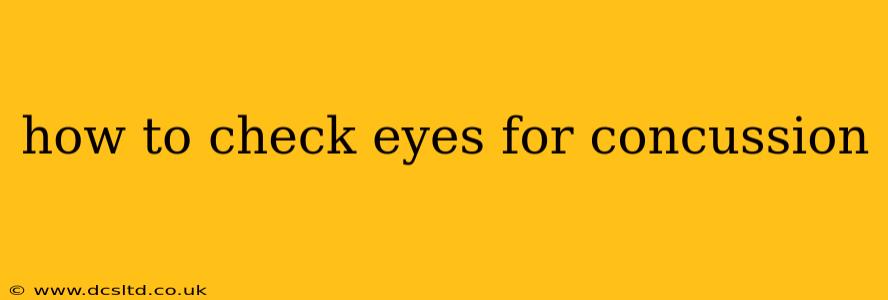How to Check Eyes for Concussion: A Guide for Recognizing Potential Problems
A concussion, also known as a mild traumatic brain injury (mTBI), can cause a range of symptoms, some of which are subtle and easily missed. While a comprehensive concussion assessment requires a medical professional, understanding how to check for potential eye-related issues can be crucial in identifying a possible concussion and seeking appropriate medical care. This guide focuses on easily observable signs; it does not replace a professional medical evaluation.
Important Disclaimer: This information is for educational purposes only and should not be considered medical advice. Always seek immediate medical attention from a qualified healthcare professional if you suspect a concussion. This guide highlights potential indicators; it is not a substitute for professional diagnosis.
What are the Eye Symptoms Associated with Concussion?
Concussions can affect the intricate neural pathways controlling eye movement and visual processing. These effects can manifest in various ways:
- Double Vision (Diplopia): Seeing two images of one object is a common symptom.
- Blurred Vision: The clarity of vision may be reduced, appearing hazy or out of focus.
- Light Sensitivity (Photophobia): Bright lights can cause discomfort or even pain.
- Difficulty Focusing: Maintaining focus on objects, especially up close, might be challenging.
- Eye Strain: Eyes feel tired, achy, or strained even after minimal use.
- Nystagmus: Involuntary, rapid eye movements (jerky or shaking). This can be subtle and difficult to detect without experience.
- Pupil Dilation or Inequality: Noticeably different sizes of pupils. This requires close observation and comparison.
How to Check for These Eye Problems?
Checking someone's eyes for potential concussion-related issues requires a careful and systematic approach:
1. Assess for Diplopia (Double Vision): Ask the person to look at an object (like your finger) held at arm's length. Inquire if they see one or two images.
2. Evaluate Visual Clarity: Ask the person to read a sentence or identify objects at varying distances. Note any difficulty or complaints of blurred vision.
3. Observe Light Sensitivity: Observe their reaction to bright light sources. Do they squint, shield their eyes, or complain of discomfort?
4. Check for Focus Difficulty: Ask the person to follow your finger as you move it slowly closer and further away. Observe for any difficulty maintaining focus.
5. Inquire About Eye Strain and Discomfort: Ask them about any feeling of eye strain, fatigue, or discomfort.
6. (Advanced and requires training) Look for Nystagmus: This is best assessed by a medical professional. It involves observing the eyes for involuntary, rapid movements.
7. (Advanced and requires training) Assess Pupillary Response: This requires specialized equipment and training to compare pupil size and reactivity to light.
Other Concussion Symptoms Beyond the Eyes
Remember that concussion symptoms aren't limited to the eyes. Other potential indicators include:
- Headache: Often a persistent or severe headache.
- Dizziness: Feeling unsteady or off-balance.
- Nausea or Vomiting: Feeling sick to the stomach.
- Balance Problems: Difficulty with coordination and balance.
- Cognitive Changes: Confusion, memory problems, or difficulty concentrating.
- Mood Changes: Irritability, sadness, anxiety, or emotional lability.
- Sensitivity to Noise (Phonophobia): Sounds seem louder or more bothersome.
How Long Do Eye Problems from Concussion Last?
The duration of eye-related symptoms following a concussion varies greatly depending on the severity of the injury and individual factors. Some individuals experience resolution within days or weeks, while others may have persistent issues for several months. Medical follow-up is crucial to monitor recovery and address any lingering problems.
What Should You Do If You Suspect a Concussion?
Seek immediate medical attention. A healthcare professional can perform a thorough neurological exam and determine the appropriate course of action. Prompt diagnosis and management are crucial for optimal recovery. Do not attempt to self-diagnose or treat a concussion.
This information serves as a preliminary guide; professional medical evaluation remains the cornerstone of concussion diagnosis and management. Always consult a qualified healthcare provider for any health concerns.
